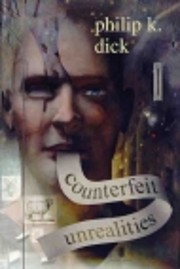

Click on a thumbnail to go to Google Books.
|
Loading... Counterfeit Unrealities (contains Ubik, A Scanner Darkly, Do Androids Dream of Electric Sheep [aka Blade Runner], The Three Stigmata of Palmer Eldritch)by Philip K. Dick
 None No current Talk conversations about this book. This book is a collection of four novellas by Philip K. Dick: The Three Stigmata of Palmer Eldritch Do Androids Dream of Electric Sheep? Ubik A Scanner Darkly My favorite was Do Androids Dream of Electric Sheep? Blade Runner was based on this story; I loved Blade Runner and of course no movie can ever really include everything in a book, even a 162-page novella like this one. Well done. The last novella was pretty good too - about an undercover cop trying to find the source of the drug Substance D; I found it to be a bit uneven, but it ended very well - and there was a very interesting and personal author's note at the end about drug misuse. P.S. I've been watching The Strain on FX network. There's a character named Eldritch Palmer - I gotta believe that Guillermo del Toro is paying homage to Philip K. Dick. no reviews | add a review
No library descriptions found. |
Current DiscussionsNone
 Google Books — Loading... Google Books — Loading...GenresMelvil Decimal System (DDC)813Literature English (North America) American fictionLC ClassificationRatingAverage: (4.19) (4.19)
Is this you?Become a LibraryThing Author. |
|||||||||||||||||||||||||||||||||||||||||||||||||||||||||||||||||||||||||||||||||||||||||||||||||||||||
Anyway, The Three Stigmata and Do Androids Dream both had portions that were so startlingly familiar that I would have sworn I'd read them before. But I'm convinced I'd never read The Three Stigmata before -- I suppose if I'd read Electric Sheep a long time ago Blade Runner may have written over portions of it in my mind in order to make sections of it seem totally new again.
All of these works, as it suggests in the anthology title, deal with one of Dick's favorite questions: "What is real?" In The Three Stigmata, reality is bent by colonists taking Can-D (some sort of empathy-enhancing hallucinogen) to interact with their Perky Pat layouts, then bent even further by the introduction of a new drug, Chew-Z, which brings its users into contact with a god-like figure. In Electric Sheep, we are led to question who is real, as Rick Deckard tries to tell androids from humans, while the reality of two main forms of entertainment -- an "empathy box," and an always-on radio and TV show are also called into question. In Ubik, time itself seems to come unfixed after an explosion -- and those affected fight to determine if it is the world that is changing or if they are the victims of some sort of psychic attack. Finally, in A Scanner Darkly, people fall apart as their realities are distorted and split by heavy drug use and the duplicitous natures of their similarly affected friends.
All four works were absorbing, provoking thought on the nature of reality. But by far I preferred Electric Sheep and A Scanner Darkly above the other two. Often, reading Dick, it is easy to get lost in what is real and what is not and miss how masterful is his understanding of human nature. In Electric Sheep, two scenes shine out in my memory: at the opening of the story, Rick's argument with his depressed wife -- who could, with the touch of a few buttons, feel hopeful, joyous, smug, fulfilled, or any other positive emotion she could think of, but reflects these feelings as false and instead experiments to find settings like despondent, lonely, despair (despite the fact that these negative feelings, also generated by her attitude box, would be just as authentic or inauthentic as the positive feelings)... Then, much later, when J.R. finds a living spider (all non-human animals have been made extremely rare by the continuous fallout from World War Terminus), Pris cuts its legs off one by one to see if it can still walk with fewer legs. That scene vibrates with such horror that it was difficult to not throw the book to the ground. Then, A Scanner Darkly is just one unrelenting unfolding horror. The ever-increasing realization that none of this can end well for pretty much anyone involved. Indeed, in the Author's Note, Dick writes about all his friends who were destroyed by their experiments with drugs. This story is the smallest derivation from reality as we know it, and that makes it all the more harrowing.
A side note -- A Scanner Darkly contained a lot of theory on the dual nature of the mind and the interplay between the two hemispheres of the brain. It strongly reminded me of Lem's writing in Peace on Earth, which makes me wonder if there were some new big studies in neuroscience that excited both of their imaginations, if they were both sparked by the same studies. It's enough to make me look up some books on the brain. To be added to the never-ending list! (